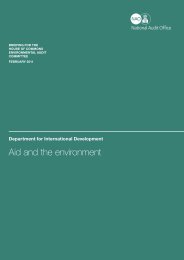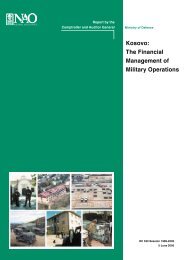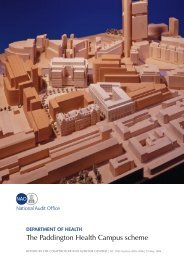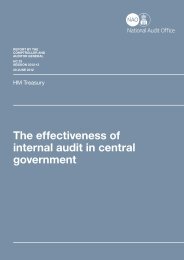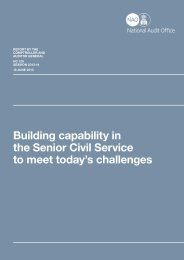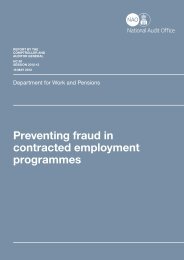Reducing bureaucracy for public sector frontline staff: Briefing for the ...
Reducing bureaucracy for public sector frontline staff: Briefing for the ...
Reducing bureaucracy for public sector frontline staff: Briefing for the ...
You also want an ePaper? Increase the reach of your titles
YUMPU automatically turns print PDFs into web optimized ePapers that Google loves.
<strong>Reducing</strong> <strong>bureaucracy</strong> <strong>for</strong> <strong>public</strong> <strong>sector</strong> <strong>frontline</strong> <strong>staff</strong> Part Two 21<br />
Figure 10<br />
Better data sharing and improvements in technology are helping to<br />
reduce <strong>bureaucracy</strong><br />
education<br />
The Managing In<strong>for</strong>mation Across Partners programme is an IT enabled, data centric set of services<br />
to enable data sharing across <strong>the</strong> education <strong>sector</strong> to reduce administrative burdens and improve<br />
personalisation of services. It comprises three services:<br />
¬<br />
¬<br />
¬<br />
a Learner Registration Service, meaning a Unique Learner Number is generated <strong>for</strong> anyone over <strong>the</strong> age<br />
of 14 in education;<br />
a learner data-sharing interface that will enable <strong>the</strong> creation of learner records; and<br />
a UK Register of Learning Providers.<br />
Learning and Skills Council estimates a saving of £7 million from Managing In<strong>for</strong>mation Across Partners<br />
Programme <strong>for</strong> both Learning and Skills Council and Qualifications and Curriculum Authority in 2008-09.<br />
Source: Department <strong>for</strong> Innovation, University and Skills, Simplification Plan, 2008<br />
uK borders agency<br />
One of <strong>the</strong> irritants identified in immigration is sharing of data between Government departments. The UK<br />
Borders Agency is planning to consolidate its existing powers to enable in<strong>for</strong>mation sharing to ensure that it<br />
obtains <strong>the</strong> in<strong>for</strong>mation it needs to carry out its work.<br />
Police<br />
The Home Office data hub is designed to provide better technology <strong>for</strong> <strong>the</strong> Home Office collection, reporting<br />
and analysis of police data. It will hold more complete data than be<strong>for</strong>e. It will also make a significant<br />
contribution to <strong>the</strong> reduction of <strong>the</strong> bureaucratic burden on police <strong>for</strong>ces by automating <strong>the</strong> required returns<br />
and reducing ad hoc data requests. By <strong>the</strong> end of 2009-10 a new Home Office data hub will automatically<br />
receive crime and human resources data from <strong>for</strong>ce management in<strong>for</strong>mation systems, halving <strong>the</strong> number of<br />
data requests to 45 by 2010-11.<br />
Source: Home Office Simplification Plan, 2008<br />
Challenges to delivery<br />
2.12 Departments are taking steps to reduce <strong>the</strong> level of unnecessary <strong>bureaucracy</strong> and<br />
<strong>the</strong> potential benefit to <strong>the</strong> <strong>frontline</strong> is great. But some challenges remain:<br />
¬¬<br />
¬¬<br />
Delivery chain – In areas of service delivery such as health <strong>the</strong>re is a long delivery<br />
chain of intermediary bodies between <strong>the</strong> central government Department and<br />
<strong>frontline</strong> service providers. Whilst <strong>the</strong> Department of Health set out how it works with<br />
o<strong>the</strong>rs in <strong>the</strong> delivery chain such as Strategic Health Authorities to reduce demands<br />
<strong>for</strong> data, it has limited ability to control all data streams. Frontline health providers<br />
reported examples of overlapping and contradictory requests <strong>for</strong> in<strong>for</strong>mation;<br />
Communication between <strong>frontline</strong> <strong>staff</strong> and central government bodies – Good<br />
communication between central government and <strong>frontline</strong> bodies is crucial<br />
to understanding where changes are needed and in reducing unnecessary<br />
<strong>bureaucracy</strong>. But systems <strong>for</strong> doing so are not always strong and Departments<br />
reported that it can be difficult to get good quality feedback on key irritations and<br />
concerns from <strong>frontline</strong> <strong>staff</strong>;




